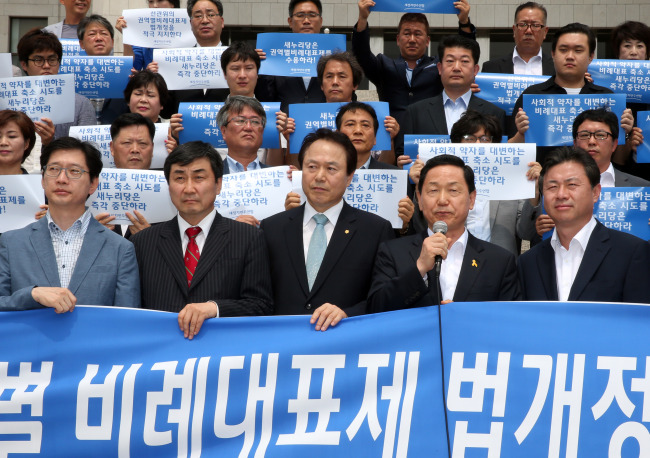The ruling Saenuri Party senior lawmaker’s decision to forgo his reelection bid sparked debate on Tuesday among the rival party’s lawmakers, who are struggling to keep afloat its fizzling party reform measures.
Following Rep. Kim Tae-ho’s surprise announcement Monday to withdraw his bid for the 2016 general election, lawmakers from the New Politics Alliance for Democracy took a veiled swipe at “privileged” NPAD lawmakers who have served multiple terms in the National Assembly.
“We are already losing the game,” Lee Dong-hak, a member of NPAD reform committee, tweeted. “Even if (Kim’s move) is nothing but a political show, we are losing on the show as well. We are frustrated, people are frustrated and Korea is frustrated.”
Echoing Lee’s remarks, Cho Guk, who also serves as a reform committee member, said in a media interview that NPAD bigwigs should make a “wise” decision over whether or not to run for the election. The law professor has urged four-term NPAD lawmakers and above to drop their parliamentary election bids to pave the way for fresh faces.
 |
| NPAD members hold a rally calling for a new proportional representation system in front of the main National Assembly hall on Tuesday. (Yonhap) |
With four incumbent lawmakers now having bowed out of the race for the election, the Saenuri Party was deemed to take the lead in political reforms aimed at discarding the vested rights, largely held on to by multiple-term heavyweights. Besides Kim, four-time lawmaker Rep. Lee Han-koo, six-time lawmaker Rep. Kang Chang-hee and Rep. Sohn In-chun have decided not to run.
Meanwhile, none of the NPAD bigwigs has made similar moves except for the party’s chairman Rep. Moon Jae-in, who dropped his bid for the 2016 general election as he ran for NPAD chairmanship in 2014. NPAD lawmakers were, on the contrary, criticized recently for proposing an increase in the number of parliamentary seats as part of their reform plans.
Considering Kim and other politician’s high-profile posts, it was widely expected that Kim’s decision would have significant political impact in the run-up to the general election that is set to take place about nine months from now.
Critics, however, remained cautious on whether the decision would bring sweeping changes in the local political scene, saying that it is more an “isolated case” of a politician who needs to take time off to prepare for his next political moves.
“It is hard to see a unified pattern among those politicians who have decided not to run,” said Lee Jung-hee, a politics professor at Hankuk University of Foreign Studies. “I believe it is exaggerating to say that (Kim’s decision) is a starting point for the ruling bloc’s reform. I think it is a bit of personal decision,” said Lee.
Kim said in the statement he could not help recognize that he became “hallow” and “weak” as he began to lose touch with the public. Last July, Kim had infamously traded barbs with the party’s chief Rep. Kim Moo-sung over the resignation of the former whip Rep. Yoo Seung-min.
“He has built a bad reputation for slipping his tongue at the party meetings. I believe that Kim’s decision has something to do with his next political move. He may want to take time off to self-reflect before considering his next political career move such as premiership and the presidency,” Lee said.
By Yeo Jun-suk (jasonyeo@heraldcorp.com)

